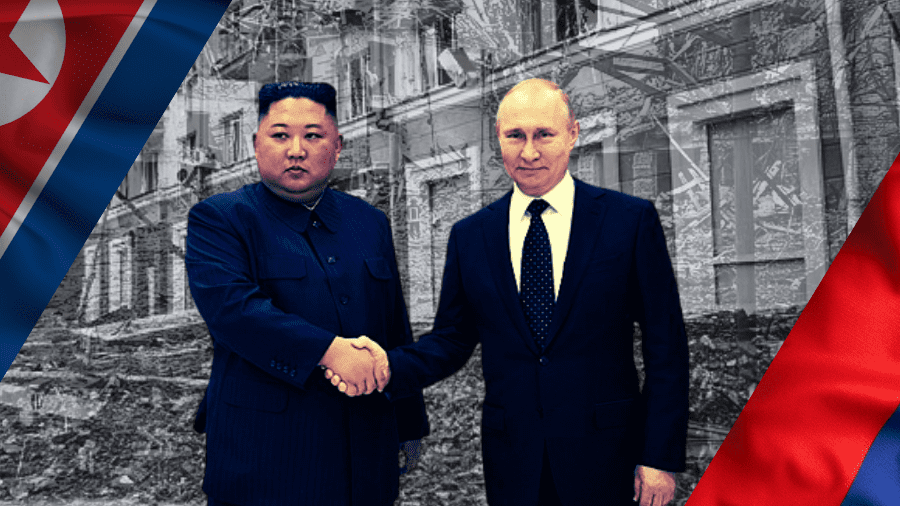This article originally appeared in the Globe and Mail.
By Aurel Braun, September 13, 2023
Appearances aside, they have much in common. Russia’s elderly Vladimir Putin and North Korea’s youthful Kim Jong Un have both shown an unwavering willingness to sacrifice the interests of their own people for their personal power, and are masterful international blackmailers and ruthless killers. Now, they desperately need each other. Cooperation between them, however, could incur a very high international cost, so they faced difficult dilemmas as they met at Russia’s Vostochny Cosmodrome on Wednesday.
Russia, despite the slowness of the Ukrainian counteroffensive, is losing the war and has not achieved its central goals. Sanctions may not have crippled the Russian economy, yet they are having a glacial but grinding effect, and thus present Mr. Putin with formidable long-term dangers. It is noteworthy that Mr. Putin demanded renewed access to the SWIFT banking system as a price for the restoration of the grain deal with Ukraine.
It is, however, on the ground that Mr. Putin has the greatest need, for though he seems to care little about his soldiers’ lives, his forces are expending vast quantities of ammunition, and losing enormous amounts of military equipment. North Korea, with its massive military arsenal and production capacity, mostly consisting of Soviet models still used by Russia, could provide Mr. Putin’s military with a vital lifeline. North Korea in turn is desperately short of food and money and is seeking advanced military technology. Russia, despite being a laggard state when it comes to its economy, is a large food exporter and has been able to generate immense revenue from the sale of fossil fuels, especially oil. It can supply North Korea with urgently needed food and funds. Both leaders, then, are highly incentivized to co-operate and can ill afford failure here. Mr. Kim, who dreads travelling abroad, would definitely not want to return empty-handed from his extended visit.
The logic of co-operation, however, increases the dangers of retaliation. Certainly, Ukraine is extremely concerned by a massive replenishment of Russia’s military resources, as are its NATO supporters. The U.S. has issued dire warnings, but it is already heavily sanctioning Russia and North Korea. For Mr. Putin and Mr. Kim, the greatest danger may emanate from the possibly negative reaction of Japan and South Korea, and consequently, perhaps China. Food and funds that may flow from Russia to North Korea themselves would deeply concern South Korea and Japan because money is likely to go to substantially strengthening the North Korean military. Tokyo and Seoul would be especially unsettled by the transfer of modern military technology. This is why, to diminish alarm, the declarations of friendship and fealty from Mr. Putin and Mr. Kim have been short so far on details, even in regard to mutual co-operation on satellite technology.
While Moscow is highly unlikely to share the crown jewels of Russian military technology, it could provide a good deal short of that to help North Korea. As a result, a Pyongyang with a more capable nuclear arsenal and superior conventional forces, all in the hands of its unpredictable leader, would exponentially increase regional volatility.
South Korea and Japan, which already are concerned about growing Chinese military assertiveness, are boosting their defence expenditures and could increase them sharply as a response to an escalated North Korean threat – a most negative development for Russia (and China). Further, Tokyo and Seoul could also decide to start to help Ukraine militarily. South Korea is already selling large quantities of potent weapons to Poland. In such a scenario, the cost of co-operation could significantly outweigh the benefits for Mr. Putin and Mr. Kim. Having gone this far in openly reaching out to each other, and in light of their respective difficult situations, it is highly likely that substantial Russian-North Korean military co-operation is in progress, but will be camouflaged and hidden in various codicils. Evidence of extensive co-operation may first emerge gradually on the battlefields of Ukraine.
The prudent course, particularly for South Korea and Japan, but also for NATO, is to assume significant forthcoming Moscow-Pyongyang military collaboration and confront that reality. Though clearly the regional democracies (or NATO) would not wish to provoke China, they need to sharply increase their defence capabilities. Crucially, it would also be a good insurance policy for them to provide Kyiv with significant military aid, so that Russia is defeated in Ukraine, and consequently the aggressive Putinite regime collapses or is at least constrained.
Aurel Braun is a professor of political science and international relations at the University of Toronto and an associate at Harvard University’s Davis Center.






